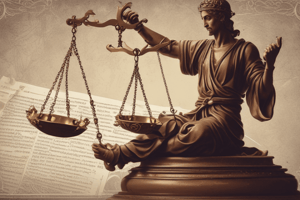Podcast
Questions and Answers
What do rules of change facilitate?
What do rules of change facilitate?
- Identify legal disputes
- Recognition of laws
- Punish wrongdoers
- Amendment of primary rules (correct)
Which of the following is NOT a function of rules of adjudication?
Which of the following is NOT a function of rules of adjudication?
- Set procedures for addressing violations
- Empower decision makers to resolve disputes
- Assign penalties to wrongdoers
- Determine the validity of new rules (correct)
What do rules of recognition primarily help identify?
What do rules of recognition primarily help identify?
- Validity of existing laws (correct)
- Punishments for violations
- Criteria for dispute resolution
- Legislative procedures
Which aspect is generally associated with rules of adjudication?
Which aspect is generally associated with rules of adjudication?
In advanced legal systems, what is a characteristic of rules of recognition?
In advanced legal systems, what is a characteristic of rules of recognition?
Which is an example of a rule of change?
Which is an example of a rule of change?
Flashcards are hidden until you start studying
Study Notes
Secondary Rules
- There are three types of secondary rules: rules of change, rules of adjudication, and rules of recognition.
Rules of Change
- Facilitate legislative or judicial changes to primary rules or secondary rules themselves.
- Include amendatory provisions of law.
- Necessary to efficiently allow primary rules to be amended.
- Specify how primary rules may be changed.
- Example: Federal Constitution can be amended, and statutes can be repealed or modified by later statutes.
Rules of Adjudication
- Give power to courts or decision makers to settle disputes.
- Include rules that empower courts to punish wrongdoers.
- Set criteria for determining when a primary rule has been broken.
- Set procedure to be followed when a primary violation has been established.
- Give authority to judges, commissions, and regulatory agencies to apply secondary rules of adjudication when appropriate.
Rules of Recognition
- Define the practice of courts, officials, and private persons in identifying the law.
- Refer to certain criteria to determine whether a rule is valid or not.
- Include references to authoritative texts, legislative enactments, customary practices, general declarations of specified persons, or past judicial decisions in particular cases.
- Allow for prediction of a rule's validity before it is made, based on conformity to the requirements of the rule of recognition.
Studying That Suits You
Use AI to generate personalized quizzes and flashcards to suit your learning preferences.



